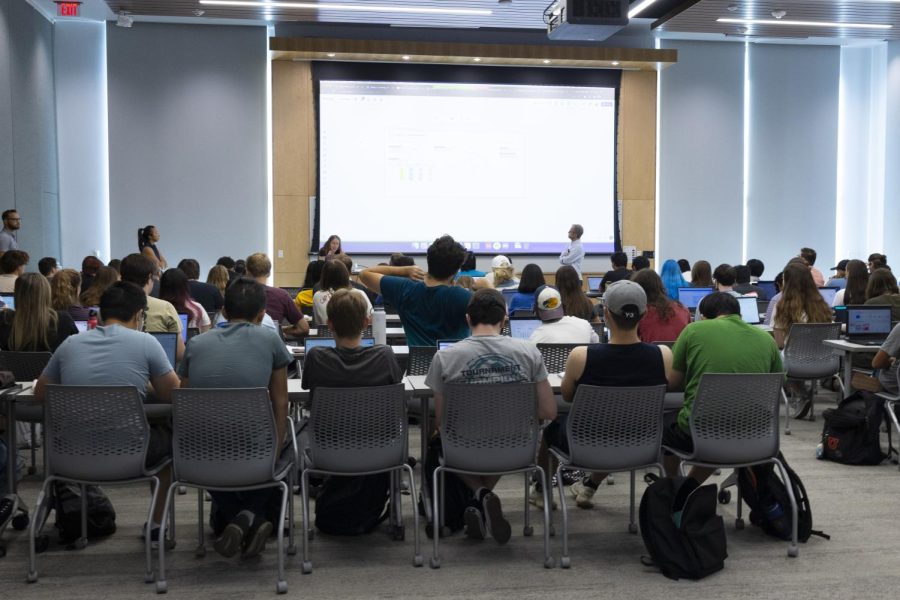Mendenhall: Group Projects Aren’t Fair to Students
Students of Introduction to Design Thinking in class in the Gardner Commons building at the University of Utah, Salt Lake City on Friday, Sept. 2, 2022. (Photo by Amen Koutowogbe | The Daily Utah Chronicle)
December 22, 2022
Universities are considered “higher education” institutions. This means we hold them to higher expectations than middle or high schools. Group projects have become commonplace in many different majors, and while they may sound like a good idea, they are the worst. Group work relies on multiple students who work towards a specific goal, rubric or project, which can be entirely unpredictable. Group projects in college are unnecessary, as they do not reflect an individual’s work, knowledge or communication skills appropriately.
We’re in College, Right?
After years of having group projects in public school, we don’t need to continue them in college. We pay a lot of money in tuition each semester, but we don’t pay to get pointless group work. Group projects feel like a cop-out for professors that teach online classes or don’t want to invest much time in their students.
Maddie Despain, a student at Weber State University, shares similar concerns. “I feel like professors do group projects because it’s easier to grade multiple people at once, instead of everybody individually,” she said. General consensus from students indicates that something about this framework needs to change.
Most of my online classes have group projects, but students take asynchronous classes for a reason (working, daily obligations, etc.). Group projects require a certain level of communication and time, which makes it incredibly difficult to match up several students’ schedules. Group projects claim to improve communication and build soft skills that future employers look for. However, these skills cannot be developed with little to no communication and uneven distribution of work.
Overachievers vs Slackers
Most professors usually try to make group work as evenly distributed as possible. However, it’s impossible to predict if a student will fulfill their portion of the assignment, which can greatly disadvantage other group members. Even when professors attempt to divide the work evenly, it usually doesn’t turn out the way they hope.
I recently had a professor assign me to edit 16 different slides of a presentation, while my other class members edited between eight and 10. Despain shared a similar situation she experienced with a group project last year. When asked if she had ever taken on more responsibility in a group project for the sake of her grade, she stated that, “I end up doing that every time I’m in a group project … I don’t want to fail because the other person isn’t putting in the effort.”
Growing up, I was also the kind of student who would pick up my classmates’ slack if they weren’t doing their work. I never wanted their lack of participation to affect my grade. It’s unfair to let other students impact our grades, and it’s ridiculous that hard-working students are affected by those who don’t attend class or do their assignments. Group project partners are unreliable, and you can’t depend on communication as much as you think. If I’m paying for school, I want to do my own work and be responsible for my grade alone. I’m tired of letting other people bring my grade down if I’m not willing to pick up the slack. It’s not something I should be responsible for.
Make Group Projects Optional
Since students do not enjoy group work, professors need to reevaluate their syllabi. Shoving a bunch of students into a Zoom breakout room or Canvas group doesn’t yield valuable results. It’s straight up irresponsible, especially if project expectations aren’t already set.
A study from Emma Clemens found that the majority of students prefer individual tasks within group projects, as opposed to more collaborative assignments. If a student doesn’t value their classmates’ ideas, they don’t appreciate any kind of collaboration work.
It’s not our professor’s job to introduce students to soft skills and interpersonal interaction. Sure, we may need these in our future professions. However, many other activities already promote these skills. Learning collaboration is what team sports, clubs and other groups are for. Campus involvement and engagement can help us fine-tune these skills, but we shouldn’t have to rely on anybody but ourselves for our grades. I don’t want to develop these skills in the classroom if they are attached to certain terms and conditions (like our grades).
Teachers and professors must recognize that students can despise group work. Yet they still assign it and watch as their students crash and burn. As students, one of the only things we can do is drop the classes that outline an overabundance of group projects in the syllabus. I’ve dropped classes for this reason, as I’m sure many other students have. We can’t always exercise this option, though. Dropping a class is a drastic measure that we shouldn’t need to take. To help avoid it, students can use a website called Rate My Professors to gain insight on how professors have conducted previous classes. At a quick glance, you can see if a professor leans heavily on group work, lectures or textbook readings. This is helpful as it can help students determine if it’s worth it to take a class prior to the semester starting. Ideally, professors must make group projects optional and provide students with the opportunity to complete individual work.
Many people work better alone rather than in groups. Group projects need to get appropriately disclosed prior to the class starting. Expectations on individual participation in group work should be clear from day one of the semester. Offering alternate options will best accommodate U students.









An Engineering Major • Dec 23, 2022 at 4:37 pm
So… this doesn’t not work with specific majors and I overall don’t agree with the full picture. Should there be more effort to make group work more meaningful and even? Yes that wouldn’t hurt. But overall even if you deal with bad teammates it’s a good skill to have because in a professional or even casual setting you will work together with people that may slack or just not be good in their roles. I don’t really understand why this article was written the way it was because I don’t think it covers the topic in as much detail as it should. It just seems like a hot take for clicks while not really looking at the actual need for group work and why it matters.